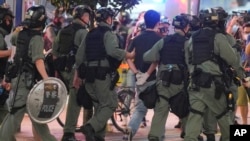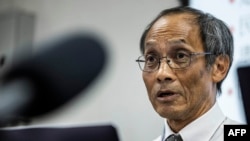Hong Kong’s largest and oldest opposition party, the Democratic Party, has announced that it will start the process of disbanding, a move that analysts say will mark “the end of an era” for the city’s pro-democracy forces.
During a press conference last Thursday, Democratic Party chairperson Lo Kin-hei told journalists that the party, founded in 1994, would set up a three-person task force to “study” the procedures needed for the party to shut down.
“We considered the overall political environment in Hong Kong and all those future plans that we can foresee, and that is the decision that we make,” he said, adding that party members’ votes will determine the final decision for disbandment. Lo did not specify when the vote might take place.
Hong Kong’s government has yet to comment on the news of the party’s possible disbandment and authorities did not respond to inquiries from VOA.
In an editorial published Monday, the Chinese Communist Party-controlled media outlet Wen Wei Po said the Democratic Party’s planned disbandment was the result of the party’s connections to detained media tycoon Jimmy Lai, who is facing several national security charges, and its support of “violent protesters” during the 2019 pro-democracy protests.
The Democratic Party, founded a few years before the end of British colonial rule, played a pivotal role in Hong Kong’s transition to Chinese governance, with some of its early leaders, including prominent figures such as Martin Lee and Albert Ho, helping to shape the “One Country, Two Systems” model, a constitutional arrangement set up to give Hong Kong a high degree of autonomy under Chinese rule.
Following Hong Kong’s handover to China in 1997, the Democratic Party became the most influential opposition force in the port city’s legislative council, leading street protests and advocating for the fulfillment of universal suffrage and direct elections that were embedded in the Basic Law, the city’s mini-constitution.
But following months-long anti-government protests that sent shockwaves across the city in 2019, Beijing initiated a series of moves to tighten control over Hong Kong, including the imposition of the controversial National Security Law, or NSL, in July 2020 and the overhaul of the city’s electoral system that essentially blocks pro-democracy candidates from running in elections.
‘Chilling effect’ felt in Hong Kong
Analysts say the Democratic Party’s decision to begin disbandment reflects Hong Kong authorities’ intensifying crackdown on pro-democracy organizations, with several opposition political parties, such as the Civic Party, deciding to shut down due to increasing political pressure and restrictions on operating.
“Democratic Party’s decision to start preparing for disbandment marks the end of the good old times when there were functioning opposition parties that could maintain a presence in the legislative council, serve constituents, and consult the government on policies,” said Maggie Shum, a political scientist at Penn State University in the U.S.
Additionally, she said, the crackdown has affected independent bookstores, independent media, and independent institutions.
“It’s like the Hong Kong government is going down a long list of democratic institutions and taking every one of them off the list,” Shum told VOA by phone, adding that the trend has created a “society-wide chilling effect” in Hong Kong.
The Hong Kong Journalist Association, or HKJA, the main journalism group in the city, was forced to scrap its annual fundraising dinner this month after two hotels cancelled bookings. The head of HKJA, Selina Cheng, has said the cancellations were likely the result of “political pressure” the hotels had faced. Local authorities have said nothing about the issue.
Additionally, the Hong Kong Public Opinion Research Institute, which tracks public attitudes on a wide range of issues in the city, announced it would suspend all self-funded research and might even “close down” after its CEO Robert Chung was summoned by national security police for investigations.
Some pro-democracy activists in Hong Kong say authorities have shifted the focus of their crackdowns to groups dedicated to issues such as labor rights in recent months.
“The Hong Kong government has proposed legislative amendments that will ban individuals convicted of national security offenses from being part of labor unions while imposing stricter vetting mechanisms on foreign funding,” said Debby Chan, a former pro-democracy district councilor in Hong Kong.
Emily Lau, the former chairperson of the Democratic Party, said these trends show Hong Kong’s political system is pivoting away from democracy.
“More than a dozen groups have dissolved over the last two to three years and in the current environment, it will be hard for pro-democracy figures or organizations to have the space to operate,” she told VOA by phone, adding that Hong Kong authorities’ goal is to “annihilate” pro-democracy figures’ attempts to “organize.”
Beijing: ‘National security safeguarded’ in Hong Kong
In response to inquiries from VOA, the Chinese Embassy in Washington, D.C., said Beijing “firmly supports” Hong Kong authorities’ efforts to “safeguard national security” and urged “critics” to “stop smearing the Chinese central government’s policy governing Hong Kong.”
“Hong Kong’s economy is booming, and the constitutional order is in stable operation, national security is safeguarded and the ‘patriots ruling Hong Kong’ is implemented,” Liu Pengyu, the Chinese Embassy spokesperson, told VOA in an email.
Shum at Penn State said Hong Kong people may “get disoriented or forced to withdraw from caring about politics” because authorities are rapidly tightening control over civil society and “taking away their power to take collective actions.”
“Hong Kong is implementing the Chinese model of governance and using an authoritarian way to control every aspect of life,” she told VOA.
Shum said Hong Kong’s people could still find symbolic ways to express support for democracy.
“The online censorship in Hong Kong is not as dire as compared to China and there are a lot of exiled media outlets reporting on the situation in Hong Kong, which serve as channels for Hong Kong people to connect with the outside world,” she said, adding that that “could potentially serve as anchors for people who care about democratic values.”




